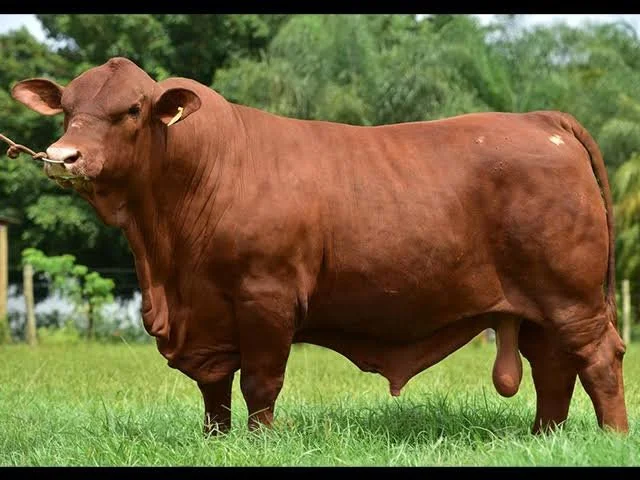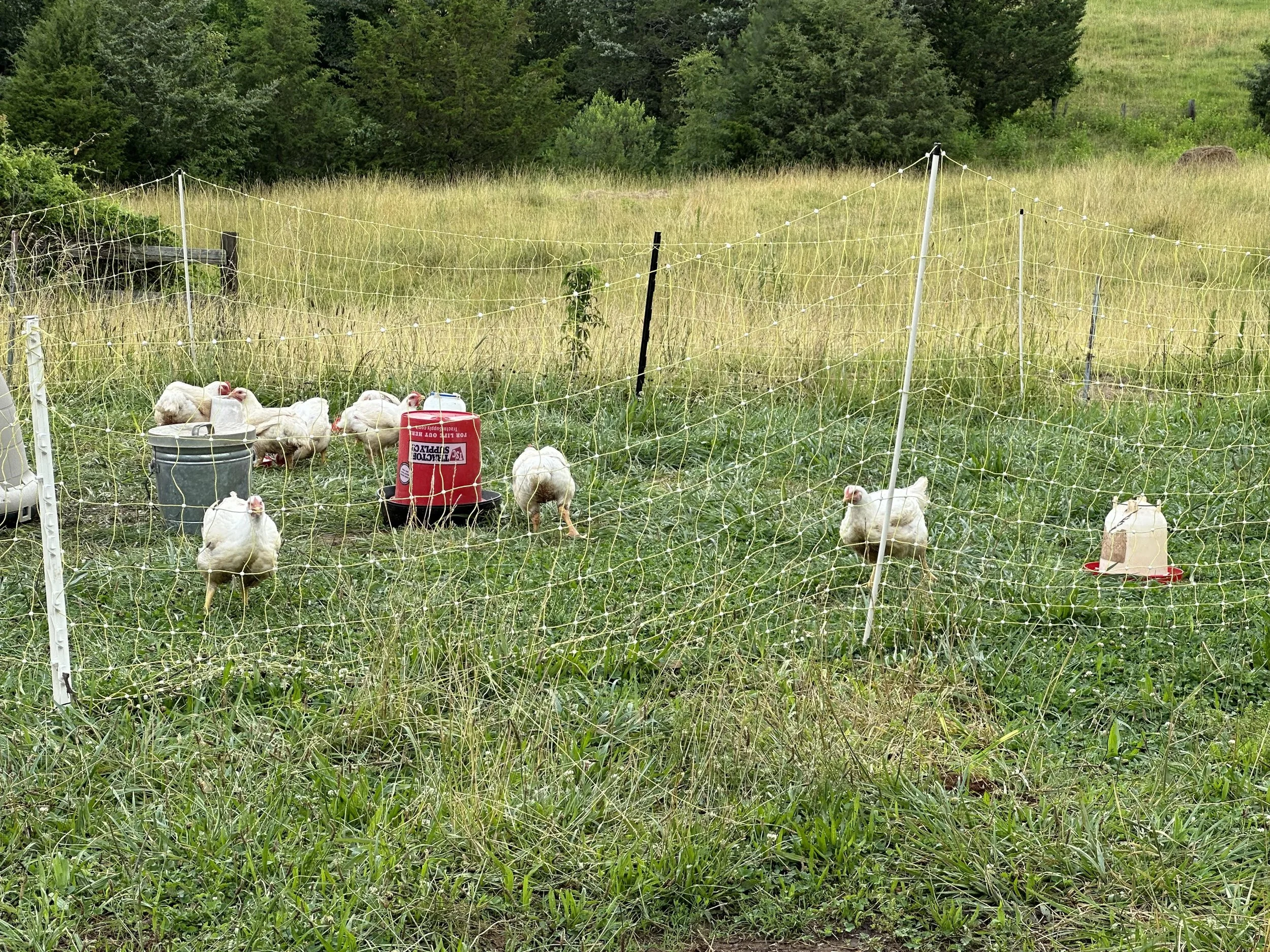Heat Genetics in Beef Cattle: Why They Matter in the South
Discover how heat genetics in beef cattle, like the resilient Senepol breed, help Southern farms extend grazing seasons, improve herd health, and produce sustainable, high-quality beef in hot climates.
Senepol bull- These cows are known for their ability to live in hot humid environments. We want to continue to raise animals that thrive in the hot south which is why we will be shifting our genetics towards heat tolerance.
As farmers and ranchers across the South strive for sustainable and efficient cattle production, one topic that continues to gain traction is heat genetics. With rising temperatures and the region's hot, humid climate, selecting cattle with superior heat tolerance is no longer optional—it's essential. One breed leading the way in this area is the Senepol, renowned for its adaptability to heat-stressed environments.
What Are Heat Genetics?
Heat genetics refer to the traits and adaptations in cattle that allow them to thrive in high-temperature conditions. These include:
Thermoregulation: Efficient cooling mechanisms like shorter, lighter coats and increased skin surface area.
Behavioral Adaptations: Grazing during cooler parts of the day and seeking shade effectively.
Feed Efficiency: The ability to maintain body condition and growth despite heat stress.
Senepol cattle, originally from the Caribbean island of St. Croix, are a standout in this category. Bred for decades to endure tropical climates, they bring heat-tolerant traits that can revolutionize beef production in the South.
Why Heat Genetics Matter in the South
Keeping cattle on grass longer is a cornerstone of sustainable beef farming, reducing the need for costly grain feeding while promoting healthier meat and soil regeneration. However, the South’s hot climate presents challenges that can limit grazing efficiency and herd health.
Here’s why heat genetics are crucial:
1. Extended Grazing Seasons
Heat-tolerant cattle, like Senepol, continue grazing during the summer months when other breeds may reduce activity. This allows producers to maximize forage use and keep feed costs low.
2. Improved Reproductive Performance
Heat stress often impacts fertility, leading to lower conception rates and longer calving intervals. Senepol cattle, with their heat-adapted genetics, maintain reproductive efficiency even in extreme temperatures.
3. Better Meat Quality
Heat stress can affect marbling and tenderness, as animals under stress often metabolize energy differently. Cattle with heat genetics stay healthier, leading to consistently high-quality beef.
4. Reduced Environmental Impact
By thriving on grass for more extended periods, heat-tolerant breeds reduce the reliance on supplemental grain, lowering the carbon footprint of beef production.
The Senepol Advantage
Senepol cattle are specifically bred for tropical climates, and their genetic traits make them an excellent choice for Southern farms:
Short, Slick Coat: Facilitates heat dissipation.
Adaptability: Performs well in diverse environments, from humid coastal regions to arid areas.
Docility: Easier to manage in high-stress conditions.
Grass Efficiency: Converts forage into weight gain effectively, even in challenging conditions.
Sustainable Farming and Heat Genetics
By incorporating heat-tolerant breeds like Senepol into their herds, Southern farmers can align with regenerative practices. These cattle not only thrive on grass for longer but also contribute to soil health by maintaining grazing pressure without over-reliance on feedlots.
Investing in the Future
As climate patterns shift, the need for heat-adapted cattle will continue to grow. By prioritizing heat genetics, farmers can ensure their herds remain productive, sustainable, and resilient—key factors for long-term success in Southern beef production.
What are your favorite southern breeds of cows? What types do you think does the best on grass?
Overcoming the Fear of Food Processing: The Local Pastured Chicken Solution
I often hear, 'I can't buy from you because I can't get over the idea of killing a chicken!' But here's a news flash: every chicken you eat has undergone processing. In the age of mass production and convenience, it's easy to become disconnected from the source of our food. However, we aim to empower local buyers with the knowledge that transparency and ethically raised food are crucial for our community's survival. We understand that for some, purchasing local pastured chicken directly from a farmer can be intimidating, primarily due to the apprehension surrounding meat processing. It's essential that we shift our perspective and focus on the numerous benefits of supporting local farmers and enjoying sustainable, ethically grown, and healthier poultry.
1. A Return to Ethical Farming Practices:
Buying local pastured chicken from us means supporting ethical farming practices. Unlike industrial farming, where animals are often raised in confined, overcrowded conditions, our pastured chickens are given space to roam freely, forage, and express their natural behaviors. The average chicken house has over 10,000 birds. With our pastured poultry, freedom, sunshine, and sanitary living conditions are the bare minimum. We allow full expression of the “Chickenness of the chicken.” Our birds are not subjected to the same stressful situations as their factory-farmed counterparts, which translates to better living conditions for the animals. Do you expect an animal never exposed to sunlight and breathes in ammonia stench from excessive fecal debris to live it’s healthiest life?
2. Know Where Your Food Comes From:
One of the most significant advantages of purchasing local pastured chicken is the opportunity to meet and develop a relationship with your farmer. We have full transparency, which allows any of our customers to gain insights into the farming methods, animal welfare, and food production processes. Have you ever driven by a chicken house? Usually, they are surrounded by 24-hour surveillance, barbed wire, and “keep out” signs. By knowing the people who grow your food, our customers have increased confidence in the quality and ethics behind their meals.
3. Healthier Chicken, Healthier You:
Pastured chicken is ethically raised and nutritionally superior to conventionally produced chicken. These birds feed on a natural diet of insects, grass, and grains, resulting in meat higher in essential nutrients like Omega-3 fatty acids, vitamins, and minerals. By allowing our birds to eat a variety of grasses, bugs, vegetation, and non-GMO feed, we are expressing the animal's optimal health. Pastured chicken tends to be leaner and contains less saturated fat than its factory-farmed counterparts, making it a healthier choice for your diet.
4. Supporting the Local Economy:
Purchasing local pastured chicken isn't just about eating better; it's also about supporting your local community. By buying directly from farmers, you are improving the sustainability of small-scale agriculture and reducing the carbon footprint associated with transporting food long distances. Buying from mass stores means you support the four conglomerates of the food industry: Tyson, Sanderson, Purdue, and Pilgrim’s Pride. If you remember from COVID, bare shelves hopefully made people realize that their lack of connection to their farmers could result in a lack of accessibility to food.
5. Environmental Sustainability:
Factory farming significantly negatively impacts the environment through its use of resources, waste production, and greenhouse gas emissions. Have you ever driven past chicken farms where the stench is so horrible you don’t even want to breathe? Farming should not have a noxious smell if done right. Sanitary conditions should never smell if the appropriate mix of carbon is added. Our pastured chickens always live in hygienic conditions because we rotate daily to fresh grass. These sustainable practices also improve soil health, sequester carbon, and enhance the local ecosystems.
We raise Cornish cross meat chickens. They are bred specifically for meat due to their quick growth and delicious flavor. Each day of their lives, they are exposed to fresh air, fresh grass, and rotated areas.
6. Redefining Food Processing:
It's important to clarify that the processing of local pastured chicken is typically done with great care and attention to detail. Many small-scale farms adhere to humane and respectful processing practices, prioritizing animal welfare. While the idea of processing may still seem intimidating, choosing locally-sourced poultry ensures that these processes are more transparent and humane compared to mass-produced alternatives.
It’s time to shift our focus from the apprehension of processing to the numerous benefits of supporting locally sustainable food. This change not only aligns with ethical, sustainable, and healthier food choices but also rekindles a sense of community and a deeper connection to the source of our food.
By purchasing local pastured chicken, you are improving your well-being and contributing to the betterment of your community and the planet. So, let's embrace the opportunity to make a difference one meal at a time and savor the flavors of ethically grown, locally sourced poultry.
We will have fresh chicken available for pre-purchase here. The chicken will be bagged and ready to eat by October 23rd, or it can be stored in your freezer for later enjoyment.
The processing date is October 20th. The birds will be available for farm pickup October 20th-October 23rd. We can deliver to Greenville on the 23th at a Central pickup location and Anderson on October 24th.
We hope you choose to #supportlocal today.




